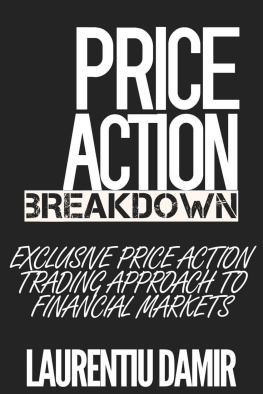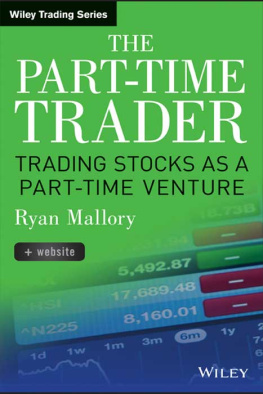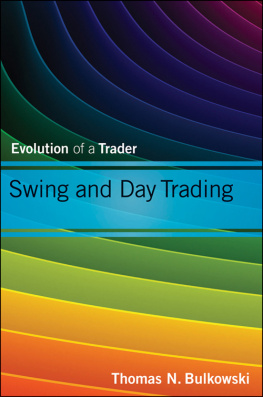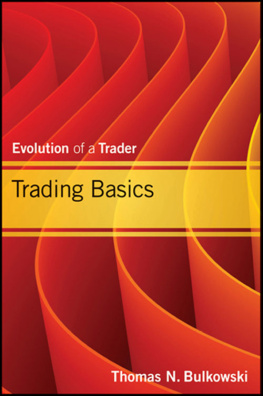
The Wiley Trading series features books by traders who have survived the market's ever changing temperament and have prosperedsome by reinventing systems, others by getting back to basics. Whether a novice trader, professional or somewhere in-between, these books will provide the advice and strategies needed to prosper today and well into the future. For more on this series, visit our Web site at www.WileyTrading.com.
Founded in 1807, John Wiley & Sons is the oldest independent publishing company in the United States. With offices in North America, Europe, Australia and Asia, Wiley is globally committed to developing and marketing print and electronic products and services for our customers' professional and personal knowledge and understanding.
Cover image: iStock.com/ricardoinfante
Cover design: Wiley
Copyright 2015 by Dick Diamond. All rights reserved.
Published by John Wiley & Sons, Inc., Hoboken, New Jersey.
Published simultaneously in Canada.
Charts in the book were created using the MetaStock trading platform, and have been used with permission.
MetaStock 2014.
No part of this publication may be reproduced, stored in a retrieval system, or transmitted in any form or by any means, electronic, mechanical, photocopying, recording, scanning, or otherwise, except as permitted under Section 107 or 108 of the 1976 United States Copyright Act, without either the prior written permission of the Publisher, or authorization through payment of the appropriate per-copy fee to the Copyright Clearance Center, Inc., 222 Rosewood Drive, Danvers, MA 01923, (978) 750-8400, fax (978) 646-8600, or on the Web at www.copyright.com. Requests to the Publisher for permission should be addressed to the Permissions Department, John Wiley & Sons, Inc., 111 River Street, Hoboken, NJ 07030, (201) 748-6011, fax (201) 748-6008, or online at http://www.wiley.com/go/permissions.
Limit of Liability/Disclaimer of Warranty: While the publisher and author have used their best efforts in preparing this book, they make no representations or warranties with respect to the accuracy or completeness of the contents of this book and specifically disclaim any implied warranties of merchantability or fitness for a particular purpose. No warranty may be created or extended by sales representatives or written sales materials. The advice and strategies contained herein may not be suitable for your situation. You should consult with a professional where appropriate. Neither the publisher nor author shall be liable for any loss of profit or any other commercial damages, including but not limited to special, incidental, consequential, or other damages.
For general information on our other products and services or for technical support, please contact our Customer Care Department within the United States at (800) 762-2974, outside the United States at (317) 572-3993 or fax (317) 572-4002.
Wiley publishes in a variety of print and electronic formats and by print-on-demand. Some material included with standard print versions of this book may not be included in e-books or in print-on-demand. If this book refers to media such as a CD or DVD that is not included in the version you purchased, you may download this material at http://booksupport.wiley.com. For more information about Wiley products, visit www.wiley.com.
Library of Congress Cataloging-in-Publication Data:
Diamond, Dick (Stockbroker)
Trading as a business : the methods and rules I've used to beat the markets for 40 years / Dick Diamond.
pages cm.(Wiley trading series)
Includes index.
ISBN: 978-1-118-47298-9 (paperback)
1. Investment analysis. 2. Speculation. 3. Investments. 4. Portfolio management. 5. Stockbrokers. I. Title.
HG4529.D497 2015
332.64--dc23
Foreword
In 1979, I was sitting between two traders at a specialty brokerage firm. The one on my left was on the phone all day, working his contacts to get preopening shares in initial public offerings, which he would jettison at a profit shortly after the deals. He solicited opinions from friends to figure out hot stocks to ride. He was always long, never short. The guy on my right was a plunger who would identify markets that were extended and then bet huge wads on a reversal. I was there when a reversal didn't come, and he was gone.
Sitting across the room was a loner who quietly worked his system. The friend to my left suggested I meet him, so I did. I asked him what he was doing. He said he traded options, and I could sit and watch if I wanted. His name was Dick Diamond.
Most of the traders in the room were chatty, but Dick was quiet. Mostly, he just watched the screen and updated his indicators. Then every now and then he would sit up straight and become hyperalert. Thenbamhe would call in a trade. (There were no electronic trading platforms back then.) He would stay on edge for a period of time, maybe an hour, and then call to close the trade. Then he relaxed again.
When I pressed him about what he was doing, he would talk about waiting for the right setups, acting swiftly and getting out while momentum was still in his favor, an absolute must when trading options. He seemed more disciplined than other traders. He wasn't trying to win a war; he was in a bunker, taking the occasional shot when his odds of a hit were 80/20. He never changed his tactics, never asked other people their opinions, and never bet big. Incredibly, unlike almost everyone else, he was also making a very good living, every single month.
I liked Dick right away because he was a pure technician. He never acted on news; he didn't care about valuation; he didn't try to solicit inside information; he didn't factor in what the economy was doing, or the president, or the Fed. He just waited for the market to signal the start of a volatile move; then he grabbed a piece of it, time and again. We struck up a friendship that's still ongoing.
In the mid-1980s, Dick and I talked about teaching his method. Subscribers were always asking me about where they could learn trading, and he was ready to show a few people how he did it. So for several years, he taught would-be traders, usually about four at a time, in his Long Island home. They would sit with him for a week as he showed them exactly what he did all day. Despite being shown the ropes, most students, for psychological and other reasons, never became as successful as he is. But every now and then he would report on one who got it and was doing well.
In the 2000s, after Dick moved to Florida, he set up seminars that would accommodate 20 or more people. Dick was trading futures by then, but he never changed his entry and exit methods. He and his partners, Roberto Hernandez and Brad Marcus, kept to the format of allowing prospective traders to learn what he was doing, in real time, for a week. Often, he would get dumb questions such as, When you get stopped out, why don't you just reverse your position? Dick's usual answer was, That's not what I do. Secretly, he was thinking, If you want to lose money on some random idea, go ahead. But, occasionally, an attendee would adopt his method and start winning more than losing.
In the 1990s, I started bugging Dick about writing a book. I said, Lots of trading books are about making killings and getting killed. Yours will be about chopping it out every day, not for a thrill but as a business. It will be a first. His wife took up the cause.
Many years went by, and no book. Dick is not a writer; he's a trader. After a false start or two, my firm put Dick together with seasoned editor Kevin Commins, with whom we had worked on several projects. Soon the trading book began to take shape.
Next page
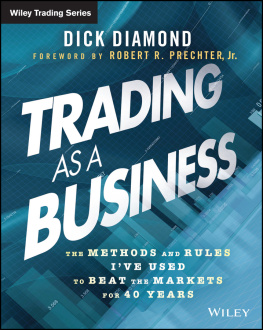
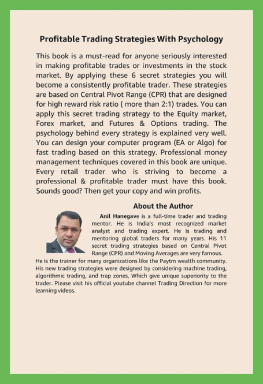

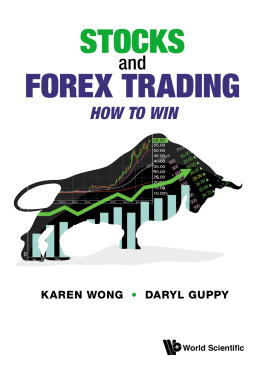
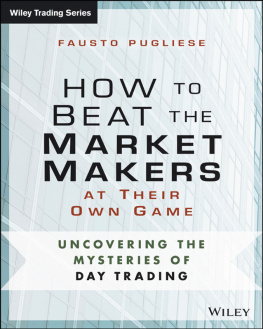
![Ryan Mallory [Ryan Mallory] - The Part-Time Trader: Trading Stock as a Part-Time Venture, + Website](/uploads/posts/book/124134/thumbs/ryan-mallory-ryan-mallory-the-part-time-trader.jpg)
